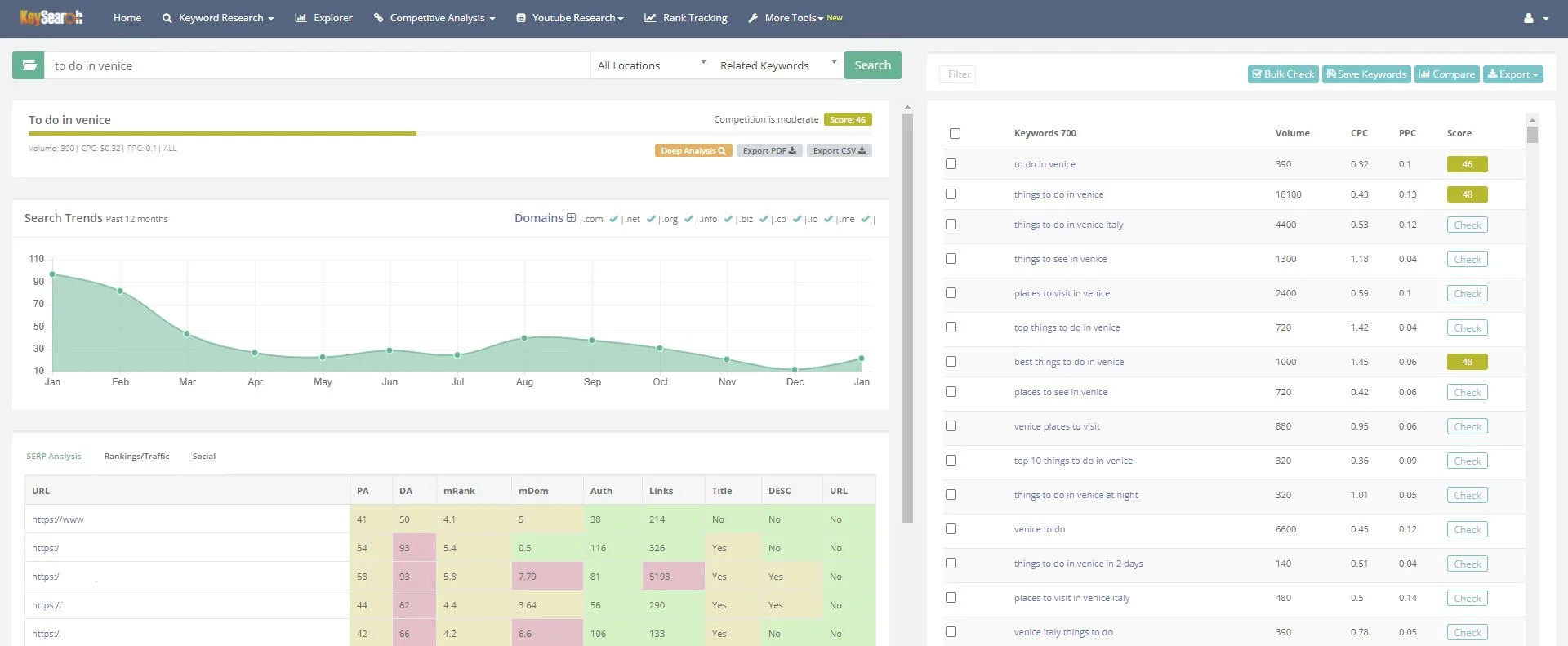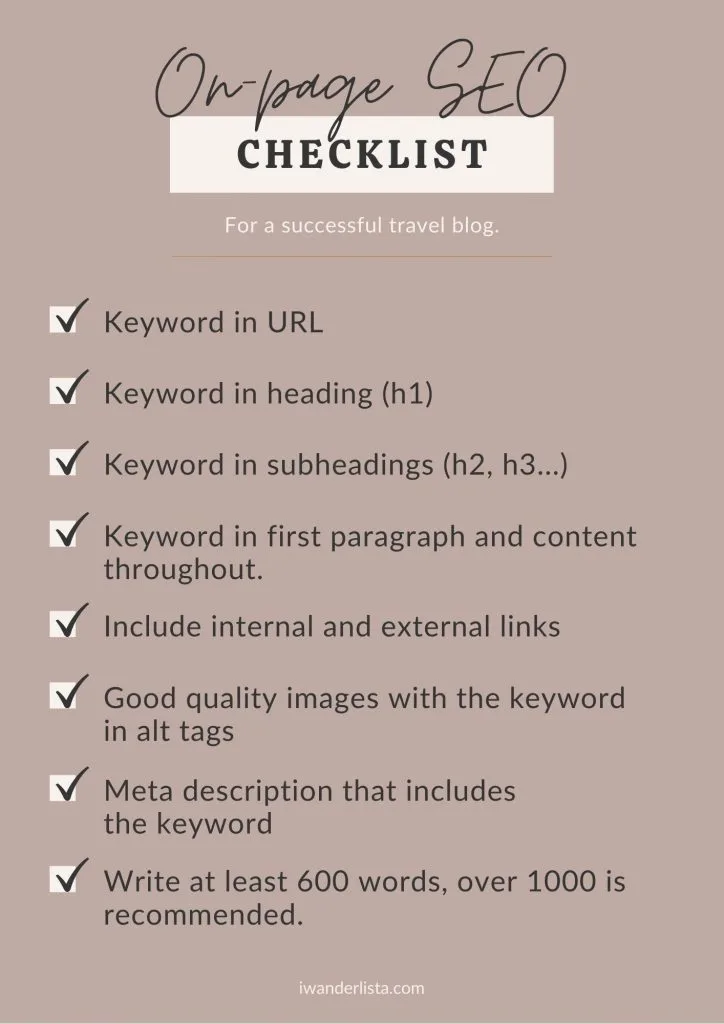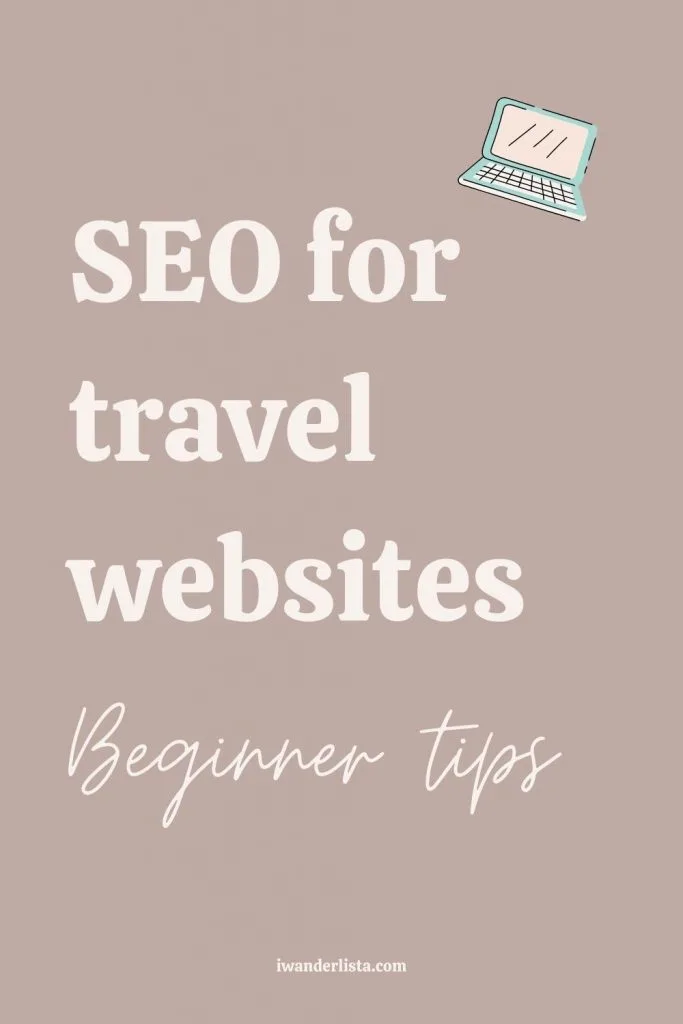When I first started blogging, I made many mistakes. I wrote short articles, had long URL’s, knew nothing about keyword research and even less about SEO (Search Engine Optimization). So, this article on SEO for travel website and blogs is something I would have wished to see when I first started out. I will share concrete tips on beginner SEO for travel blog, including all my (not so secret anymore) secret tips.
What is SEO?
SEO or Search Engine Optimization is, in short, a way of optimizing your content for search engines aka Google, Bing, Yahoo etc. I know this term is not the easiest to understand for a beginner, but I will try my best to explain it to you in an easy way.
When you write anything on a public website, Google will decide how much value it gives to the people searching for it. What you are essentially doing is making search engines like you, because you provide answers to what their clients (people of the world) are searching for. The amount of searches for any term is easily seen in both free and paid SEO sites, such as SEMRush, Keysearch, or Ubersuggest. You will learn there are many ways in SEO to make search engines like you, but the tips below are what I personally used to get my blog from 100 visitors a month to over 100.000 in just a year of blogging.
So, if your goal is to make money from blogging, it is important that you use these tips on SEO for travel website and blogs from the start.
Write useful and awesome content
From searcher perspective
For the purpose of this article, we will pretend you are planning a trip to Italy. Because this is your first time planning this trip, you don’t know anything about the country and just want to see what there is to do there. So, you might go on Google and search for ‘things to do in Italy’. You’ll open a few articles on the first page & if you found good answers, you will most likely never click on page 2 on Google. And that’s not unusual, 91% of people only click on the articles they see on page 1 and 27% of those only on the first one.
This means, that if the person who ranks number 1 on your search, did a good job on telling you what the things to do in Italy are, they wrote good content that answered your search. You are happy, and Google is happy. Google is happy because their algorithms told them that the people searching the term didn’t need to click on the second or third result to get the answer, but got everything on the first one, which makes Google believe it did a good job positioning it first.
The number of people searching for things to do in Italy (taken from Keysearch):

From the image, I see that there are 8100 people searching for this term per month and that the competition is moderate (47). As a new blogger, I would not write an article on this topic, because I am likely not going to rank high on it. More on this later.
Now let’s say you found a few good things to do in Italy and want to start narrowing your search down. Now you know you want to visit Venice in Italy. So you’ll start searching for things to do in Venice. Again, you’ll see that there are lots of articles written on this topic and you got your answer on the first page, again.
This is how many search for this term:

As a new travel blogger, I would not attempt to rank high on this term either.
From blogger perspective
You saw that the person searching for those terms likely got their answers on Google. This means that will most likely not come across your post on either search term because your competitors already answered with great content.
You need to think from a blogger perspective and do a little keyword research. If someone is interested in visiting Venice, maybe they also want to know about doing some activities. So after searching under a few more words for Venice I noticed ‘kayaking in Venice has a fairly low competition score. If you get very lucky, you will find a keyword with a blue score (very low competition) and a high volume. If you find one like this, write an article right away!

Now you see that there might only be 390 people searching for this per month, but the competition score is 25 (the lower the better), which means you have great potential in answering those 390 people where the best cooking classes in Venice are.
As a new blogger who wants to write about popular destinations, make sure you try and write about things that not many others are writing about. If you do this and answer the question in 600 words or more, Google will like you very much and place your article first. This is vital to good SEO for travel website and any blog or site alike.
TIP: install Grammarly plugin. It’s important that you do not use grammar mistakes in your content and this browser plugin is literally my savior.
Keyword research
Keyword research means using an SEO site that helps you understand search volumes, your competition and trending topics. If you look at all three from the start, then you’ll have a travel blog that will rank highly and get many organic visitors every month.
Keywords are the only key to success when it comes to any SEO for travel website and blog. And being the only key to success, they also do not come for free. Or, if you decide to fully rely on Ubersuggest, then it will be free, but not the most successful.
I personally use Keysearch for doing keyword research. It’s very simple to use and most importantly, cheap. I have not yet found a better site that does simple and effective keyword research.
So when I do a search for to do in Venice, this is what it will look like in Keysearch:

Where you see ‘Check’, it will mean that every time you click on it, you will see the competition score on the search term. For $17 a month (or with my affiliate link for $13.60, 20% discount every month with the code WANDER20), you will get 200 searches. I never use them up, actually, I tend to do about 50 per month now that I kind of know what I can rank for. My affiliate link gives me a small percentage from your subscription and you save 20% – a win-win situation! It is not sponsored, I also got mine through someone else’s affiliate to save money.
In the start, do lots of searches and check out the competition as well (lower left side on Keysearch, I removed URLs) to see if you can outdo them on their content. So, all in all the optimal keywords have a big search volume and low competition. They are rare, but they do happen – especially if you decide to write niche articles or about niche destinations or topics!
QUESTION: So, tell me – can you guess what the keyword for this article is? Answer in the comments below!
Keywords in your post
Once you’ve done your keyword research you will use that keyword EVERYWHERE. But to help you with knowing if you’re doing a good job, install a good plugin for SEO for travel website! I use RankMath and used to use Yoast. I much prefer RankMath and Yoast has been reported to have quite a few issues in the past year.
You will use your keyword, let’s say ‘cooking classes in Venice’ in your title, URL, the article itself, and meta description (RankMath will help you with all of those).
There is a lot more to learn on keywords, but this is the simplest way to start with the SEO on a new travel website.
On-page SEO
In short, on-site SEO is what you do on your own page to optimize the post. Off-page SEO is what you (or others) do outside of your own page (more on this below).
When it comes to on-page SEO for travel website or any other website for that matter, there are a few things to keep in mind. Keywords are the most important, but so are other ranking factors like images and external and internal links. I will delve a little more into speed below, but with everything else you will get great suggestions straight from the SEO plugin RankMath.
The below checklist you can save to your Pinterest or desktop and use as a reference to think about every time you write a new post. If you successfully implement all the below suggestions, then you are only dependent on your content to do the rest!

Off-page SEO
Off-page SEO is about everything you, and others, do outside of your own website. So if you want the SEO for travel website to be successful, you need to focus on three things when it comes to off-site SEO:
1. Link building
2. Social media
3. Branding
Link building
You will rank higher if more high-quality websites link to your website. The quality of the other websites is determined by DA (Domain Authority) and is the ranking of the overall website. The higher the DA, the better as Google sees this as a more trusted source. You can check anyone’s DA via MOZ.
Ideally, you will also want links from relevant websites in your niche (mine is travel). This way Google will see that others in the same niche trust your website.
There is an entire strategy only for backlinking, but I suggest you start small, with Facebook Groups. There are plenty of Link Swap groups for travel and other bloggers that you can join. Just do a search on Facebook. If you will swap links, then just keep a sheet with swaps (some people are not so nice and remove the swapped links, I do a check twice a year) and make sure they are do-follow links, with a good anchor text and in the content itself (not on a read more section).
Off-page SEO is a long-term project. On-site you will be done with as you finish writing the post, but off-site is something you continuously do with the site.
Social media
Engage and post regularly to your social media accounts. The most valuable SoMe for me have been Pinterest, TikTok and Facebook. Instagram is downright useless when it comes to travel blogs. The audience is not engaged. Pinterest should be your biggest focus and every post you write should also have some pins attached for people to save them to their Pinterest boards.
If you have the energy, then create a Facebook group as well. They work very well, but be mindful they also require a lot of work!
Technical SEO
Site speed
This is a big one and I wish I had known this before I purchased my first theme and did 1 year of work on it. Heavy themes with page builders such as WPBakery, Elementor etc. should not be considered if you want to earn money from blogging. Purchase light SEO optimized themes and build your website only with WP’s tools and builders, such as Gutenberg. It may not look the prettiest, but it will mean a huge difference when it comes to your page speed. Google likes fast websites and you will rank higher if you have a faster site than your competitor.
You can check your page speed anytime with two free resources: GT Metrix and Google Page Speed. From these you can see how well your website is performing in terms of speed and give you suggestions on what you need to fix.
Optimize for mobile
Over 80% of my readers access my site on mobile & yet I still pay too much attention to how my desktop site looks (as every blogger does). Pay attention to your website’s mobile design and site speed via Googles Speed Test. Make sure your SEO for travel website is responsive, that all areas open as they should and that the fonts and images are big enough.
Tips
My best tip for succeeding in SEO for travel website is to join Facebook groups. The community will help you so much! Here are my top 3 favorites:
Make Traffic Happen – SEO and general website tips
Wandering Women Travel Bloggers – For weekly threads on Pinterest and blog engagement
WordPress Speed Up – For speed tips from pros
I hope this guide to SEO for travel website helped you on your journey to becoming a blogger! The tips I shared here are my own personal best practice combined with general tips on SEO and travel blogging. If you have any questions at all about this topic, then please comment below. I will answer every question! Good luck!
Save this article for later:




Ali
Monday 2nd of January 2023
Oh. And Slovenia - I just visited there and stayed in Logar Valley. Your birth country is amazingly beautiful.
Lynne
Sunday 8th of August 2021
Thanks for sharing the valuable insights about SEO. It helps me to gain an overview of what to consider when starting off a website as a newbie, much appreciated!
Patricija
Sunday 8th of August 2021
I'm happy you found it helpful! :)